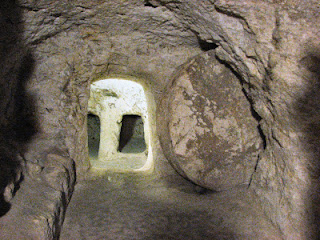Who, or What, is the Word of John 1:1?”, Exegesis of John 1:1, Part 2, with Rivers O Feden
Outline notes for One God Report Podcast #18
To hear the full podcast click here.
In the previous podcast, Rivers and I reviewed reasons for understanding the first phrase of John’s Gospel “In the beginning” as a reference to the new beginning that God is bringing about through Jesus the Messiah.
1. In this podcast we consider how to best understand what or who John meant in by the word “word” in the phrase: “In the beginning was the W/word”. The Greek word for “word” is logos. We will often refer to the word, “word” using this Greek term, logos.
2. As with the phrase “in the beginning” the meaning of logos, “word” in John’s prologue is best understood and defined first and foremost by other uses of the same word in John’s Gospel. We shouldn’t ignore or dismiss how the author himself uses logos and go looking for its meaning in other extra-biblical literature. Logos and in its various forms occur nearly 40 times in the Gospel of John, and in the vast majority of occurrences logos means: a word, a verbal expression, a statement, a teaching, a saying, something spoken.
4. Rivers places a bit of a different emphasis on how Jesus is the logos, stating that in the Gospel of John, logos is primarily the verbal utterance or teaching of Jesus, that is, things that Jesus said during his public ministry, and that it is difficult to separate the verbal utterance from the speaker Jesus.
5. We address the question: “If Jesus is the Logos of John’s Prologue, why isn’t he called the Logos again in John’s Gospel outside of the Prologue?
6. We analyze how both deity of Christ theologians and One God believers who see John’s prologue as commentary on the Genesis creation have gone outside the Gospel of John to define what John’s logos means. Rivers outlines the steps that One God believers (so-called Biblical Unitarians) have taken in an attempt to make logos of John’s Gospel synonymous with personified wisdom of Proverbs 8 and other extra-biblical literature. It’s a fairly twisted path that Biblical Unitarians of this persuasion have had to take. The steps are something like this:
a) Accept the assumption that “in the beginning” of John 1:1 is describing directly the Genesis creation.
b) Rejecting the Trinitarian assumption that logos is a pre-human member of a trinitarian godhead, logos is taken to be an abstract plan, purpose, intention, or wisdom of God which “existed” prior to creation.
c) Next, the “in the beginning” of John 1:1 and Genesis 1:1 are compared to Proverbs 8, where the abstract wisdom is personified as existing before, and involved in creation.
d) “Unfortunately”, wisdom is not mentioned at all in the Gospel of John. Neither is prudence, which is also personified in Proverbs 8.
e) So wisdom has to made synonymous with logos by appealing to other external, non-biblical wisdom literature. If wisdom can be made synonymous with logos, then, the reasoning goes, the personification of the abstract wisdom of Proverbs 8 can control the definition of logos in John 1, making logos of John 1 an abstraction that is personified like wisdom is personified in Proverbs 8.
7. Rivers gives a couple examples of how if one wants
to use the same methodology, but using only the Gospel of John, Jesus can be
shown to be the logos.
8. But again, this is not the best method to determine the meaning of logos in John 1. There is no logos in the Genesis creation account. Neither is wisdom mentioned at all in John’s Gospel. It is much preferable to look at the language in the Prologue and in the entire Gospel of John and allow the author himself to define a term like logos.
9. Bill sees that the same kind of thing happened with “deity of Christ” interpretations of John 1:1, but from a different direction. “Deity of Christ” interpretations of logos in John 1 adapted into Christianity non-biblical, Greek philosophical ideas of what or who logos was. To some Greek philosophers, the logos was some kind of a secondary or intermediary divine emanation or being. 2nd century Gentile church fathers, influenced heavily by Greek philosophy, jumped on these Hellenistic concepts of logos, and imposed these ideas on to their interpretation of John 1 by stating that the logos was a pre-existent divine figure who then “took on flesh” as Jesus.
10. But for these 2nd century church fathers, the Logos was a secondary, lesser god, subordinate to the Supreme God. Ideas of co-eternality and co-equality among members of the godhead came later. For a more detailed description of the process of how 2nd century Gentile so-called “church fathers” adopted Greek ideas about the logos into Christianity, see the One God Report podcast #10 Evolution of the Trinity, interview with Dr. Dale Tuggy, part 1.
12. Finally, I suggest that contrary to claims that John’s definition of logos can be informed by Hellenized conceptions of the word, John may have used logos as a polemic, that is, as a direct attack and contrast to Greek ideas. “You Greeks have it wrong. In this description of the human Jesus I will tell you how the Father, the only God, has communicated with humankind”.



Comments